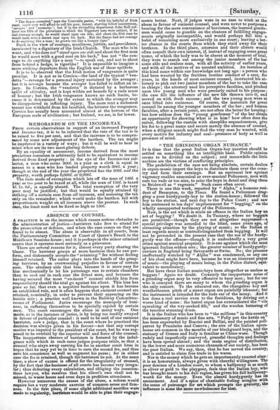ABSENCE OF COUNSEL.
A PRACTICE is on the increase which causes serious obstacles to the administration of justice—barristers take fees to attend for the prosecution or defence, and when the case comes on they are found to be absent. The abuse is observable in all courts, from the Parliamentary Committee or Court of Queen's Bench to the Middlesex Sessions-house ; and it is perhaps in the minor criminal courts that it operates most seriously as a grievance. There are several reasons for it, almost every party sharing the blame. The barrister grasps at more business than he can per- form, and dishonestly accepts the " retaining " fee without feeling himself retained. The suitor plays into the hands of the grasp- ing barrister, by an overweening prejudice in favour of certain men. The attorney aids that bias, because it is more easy for him mechanically to let his patronage run to certain chambers than to seek out in each case the fittest man, and because the having secured the most " eminent " counsel shields him from responsibility should the trial go against his client. This bias has gone so far, that even a negative burlesque upon it has become an established rule, and it often happens that eminent counsel are retained, nominally, in order to prevent their appearing on the hostile side ; a practice well known in the Railway Committee- rooms of Parliament. Juries encourage the monopoly of busi- ness, in suffering themselves to be specially cajoled by certain men. The court encourages the abuse in many ways. One mode, as in the instance of juries, is by being too readily swayed in favour of particular counsel : it used to be said of one eminent barrister, now a judge, that in the court where he practised the decision was always given in his favour—not that any corrupt motive was imputed to the president of the court, but he was sup- posed to be overlaid by the superior will and force of the counsel. The inopportune absence of barristers is fostered by the indul- gence with which in such cases judges postpone trials, so that a counsel who stays away earning his fee in another court lives in hopes that he may yet be in time to earn the second fee, and thus save his conscience as well as augment his purse ; for in either case the fee is retained, though the barristers be not. At the same time, a show of excuse is offered for the irregularity of cnunsel, by the fact that the business of all courts has become very irregu- lar; thus defeating every calculation, and obliging the conscien- tious lawyer, who resolves that his client's case shall not be missed, to waste hours and even days in profitless attendance. However numerous the causes of the abuse, a reform would require but a very moderate exercise of common sense and firm- ness. In the first place, if some slight additional sacrifice were made to regularity, barristers would be able to plan their engage-
ments better. Next, if judges were in no case to wink at the abuse in favour of eminent counsel, and were never to postpones hearing for the mere convenience of barristers, the learned gentle- men would cease to gamble on the chances of fulfilling engage- ments originally incompatible, and would perhaps fall into a habit of remaining more exclusively in one court; leaving a bet- ter chance in the courts from which they staid away for their brethren. In the third place, attornies and their clients would often consult their own interest, if, instead of engaging some great name, of which the body was to be absent at the moment of trial, they were to search out among the junior members of the bar some able and zealous man, with all the activity of earlier years, and with all the motives of an unsated ambition. An instance of this kind came within our knowledge not long ago : a person who had been wearied by the fruitless routine conduct of a case, for years, in the hands of most eminent counsel, instructed his at- torney to pick out two junior members of the bar to take the case in charge ; the attorney used his perceptive faculties, and pitched upon two young men who were precisely suited to his purpose; the case felt the influence of the new life thrown into it, and moved on with fresh success ; and the two young men were at once lifted into eminence. Of course, the materials for great counsel lie among the younger members of the bar ; and human faculties, after a certain point, are not often the better for keeping: but how seldom does the "young gentleman " of the bar obtain an opportunity for showing what is in him how often does the suitor, following the custom with sheeplike sequaciousness, give his fee to a great name and secure merely the absence of counsel, when a diligent search might find the very man he wanted, with every motive for industry and zeal—presence of body as well as presence of mind.


























 Previous page
Previous page